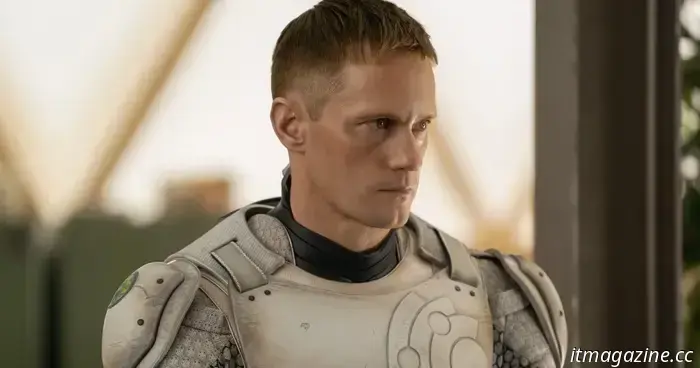
Murderbot: Chris and Paul Weitz discuss effective strategies for adapting books into films.
Academy Award nominees Chris and Paul Weitz understand that collaboration is essential for a successful adaptation from book to film. They emphasize the importance of alignment among everyone involved; if one person is out of sync, it can create issues, according to Chris. Fortunately for the Weitz brothers, the creative team shared a unified vision for "Murderbot," a new sci-fi comedy on Apple TV+.
Based on Martha Wells’ book series, "Murderbot" features Alexander Skarsgård (The Northman) in the titular role of a security cyborg designed to protect and follow human orders. Disdainful of humans, whom he considers “idiots,” Murderbot hacks into his programming to gain free will. With this newfound autonomy, he indulges in binge-watching the space opera "Sanctuary Moon." During his mission, Murderbot must conceal his free will from humans, as discovery would force him to engage with them, which he despises.
In the discussion that follows, the Weitz brothers applaud Skarsgård’s portrayal, share insights about the collaborative process of adapting the book for screen, and express their admiration for "Sanctuary Moon."
Apple TV+
This interview has been condensed for brevity and clarity.
Digital Trends: One of the highlights of the show is Alexander’s voiceover, which humorously conveys Murderbot’s feelings. Reflecting on your careers, if you could add voiceovers to any of your past characters in movies or shows, who would you pick?
Paul Weitz: I would add a voiceover to "Little Fockers."
Chris Weitz: [Laughs] I think we’d each choose a film where we felt the message didn’t quite get through and provide our own commentary on the choices we had to make due to marketing decisions.
Paul Weitz: [Laughs] Just incorporate Beavis and Butthead. They don’t even need to appear; just have a constant commentary.
I believe any movie could benefit from Beavis and Butthead.
Paul Weitz: Perhaps.
Chris Weitz: That was indeed the theory back then.
Both of you have experience in adapting films and TV shows. This can be advantageous because you possess a clear direction, but it can also be challenging to decide what to retain and what to cut. From your experience, what is the trick to a successful adaptation?
Apple TV+
Chris Weitz: It’s crucial for all parties involved—the lead actor, the author, and the financier—to share a basic understanding. If anyone perceives they are not producing the same film or show, issues will arise. We were fortunate that the head of Apple Films and TV was a fan of the books. Alexander naturally grasped the character as described in the novels, and Martha Wells was very receptive to collaborating with us to create new content.
I believe we recognized what made the books special. Since it’s a novella, a very brief story, we needed to devise enough content that was meaningful and not just filler to sustain an entire season, as we appreciated the book's ending and intended it to conclude the first season. We frequently exchanged ideas with Martha, incorporating her suggestions and pitching our concepts, leading to a productive collaboration.
Paul Weitz: Yes, my perspective on this has evolved significantly as I’ve progressed in my career. At this point, I want to collaborate exclusively with authors who are eager to be part of the process. They represent the primary audience. … I’ve adapted memoirs, which involve portraying someone’s life. If the subject isn’t engaged, what’s the point? [Laughs] It feels almost unethical.
Then they might criticize you if the movie doesn't turn out well.
Chris Weitz: They have every right to.
Paul Weitz: Even if they choose to remain quiet, you can be confident they are harboring negative thoughts about you.
I found Alexander’s portrayal of Murderbot intriguing. He embodies a robot with social anxiety—uncomfortable with eye contact and exhibiting deliberate, mechanical movements. I’m interested in how you collaborated with Alexander regarding the physicality of his performance.
Paul Weitz: Those movements also reflect a sense of depression. [Laughs] There’s the mechanical aspect, but we didn’t exaggerate it too much. Initially, we noticed he tended to lean his head forward, and at one point he remarked, “I’m doing that intentionally. Is that okay?”
Chris Weitz: It created a distinctive slouch. In some respects, it conveys both depression and the posturing of someone engrossed in their cell phone. You don’t see the phone, but essentially, Murderbot is mentally absorbed in watching videos instead of confronting real life. So, how do you approach the portrayal of a robot or cyborg for the umpteenth time without circling back to the same clichés?
You want the character to feel factory-made, without the need to shift or scratch as humans do. In later books, it learns



Other articles
 Acer is developing a smart ring and approaching it in the right manner.
Acer has introduced a quite comprehensive smart ring named FreeSense. It has an attractive design and, fortunately, does not impose any subscription fees on customers.
Acer is developing a smart ring and approaching it in the right manner.
Acer has introduced a quite comprehensive smart ring named FreeSense. It has an attractive design and, fortunately, does not impose any subscription fees on customers.
 AMD's perspective on the longevity of the AM4 socket, the introduction of AM5, and what lies ahead.
AMD's AM4 socket has been in use for nearly eight years and continues to perform well. Find out AMD's perspective on why it has maintained this socket for such an extended period and why it might continue to do so for many more years.
AMD's perspective on the longevity of the AM4 socket, the introduction of AM5, and what lies ahead.
AMD's AM4 socket has been in use for nearly eight years and continues to perform well. Find out AMD's perspective on why it has maintained this socket for such an extended period and why it might continue to do so for many more years.
 8 upcoming summer films we are excited to see
The summer movie lineup typically includes a lot of Marvel and other comic book adaptations, but this year features just one major superhero film. Audiences will have to settle for dinosaurs, racing, karate, and Tom Cruise sprinting around without a shirt (possibly for the last time?).
8 upcoming summer films we are excited to see
The summer movie lineup typically includes a lot of Marvel and other comic book adaptations, but this year features just one major superhero film. Audiences will have to settle for dinosaurs, racing, karate, and Tom Cruise sprinting around without a shirt (possibly for the last time?).
 NYT Crossword: solutions for Sunday, May 18
NYT Crossword: solutions for Sunday, May 18
 Kindly purchase some earbuds.
The trend of people playing audio from their phones at high volume has reached epidemic proportions. Using a pair of earbuds could alleviate this issue.
Kindly purchase some earbuds.
The trend of people playing audio from their phones at high volume has reached epidemic proportions. Using a pair of earbuds could alleviate this issue.
 An AI application captures a selfie of a nail to identify a blood condition that impacts billions of people.
Specialists at Chapman University have created a mobile application that requires images of nails to identify indicators of anemia, a recognized blood disorder, with great precision.
An AI application captures a selfie of a nail to identify a blood condition that impacts billions of people.
Specialists at Chapman University have created a mobile application that requires images of nails to identify indicators of anemia, a recognized blood disorder, with great precision.
Murderbot: Chris and Paul Weitz discuss effective strategies for adapting books into films.
In an interview with Digital Trends, Chris and Paul Weitz discuss the adaptation of Murderbot into a sci-comedy for Apple TV+.
